| Listing 1 - 7 of 7 |
Sort by
|
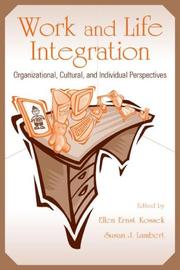
ISBN: 0805846158 0805846166 9786612322754 1135622817 1283883201 1282322753 1410611523 9781410611529 9780805846157 9780805846164 9781135622763 9781135622800 9781135622817 1135622809 9781283883207 9781282322752 6612322756 Year: 2005 Publisher: Mahwah Erlbaum
Abstract | Keywords | Export | Availability | Bookmark
 Loading...
Loading...Choose an application
- Reference Manager
- EndNote
- RefWorks (Direct export to RefWorks)
Work-family researchers have had much success in encouraging both organizations and individuals to recognize the importance of achieving greater balance in life. Work and Life Integration addresses the intersect between work, life, and family in new and interesting ways. It discusses current challenges in dealing with work-life integration issues and sets the stage for future research agendas. The book enlightens the research community and informs the public debates on how workplaces can be made more family sensitive by providing contributions from psychologists, sociologists, and econo
Work and family --- Organizational change --- Family policy --- Travail et famille --- Changement organisationnel --- Politique familiale --- Congresses. --- Congrès --- #KVHB:Arbeids- en organisatiepsychologie --- #KVHB:Gezin --- #KVHB:Arbeid --- Congrès --- Families --- Families and state --- State and families --- Families and work --- Family and work --- Government policy --- Public welfare --- Social security --- Social policy --- Dual-career families --- Work-life balance
Book
ISBN: 9264007970 Year: 2005 Publisher: Paris : OECD-Organisation de cooperation et de developpement economiques,
Abstract | Keywords | Export | Availability | Bookmark
 Loading...
Loading...Choose an application
- Reference Manager
- EndNote
- RefWorks (Direct export to RefWorks)
La politique sociale est souvent dénigrée au motif qu’elle est un fardeau pour la société. On lui reproche également de saper l’esprit d’entreprise, de décourager le travail et l’épargne et de favoriser la dépendance à l’égard de l’État. Une politique sociale mal conçue peut effectivement avoir des effets négatifs, mais une politique sociale mal conçue n’est pas une fatalité. Nous disposons depuis quelques années d’un ensemble de plus en plus riche d’observations qui nous montre quels sont les programmes efficaces pour améliorer les conditions sociales et ceux qui ne le sont pas. Lorsqu’elle est bien conçue, la protection sociale n’est pas un lourd héritage du passé, mais un atout vital à l’appui du développement social. La protection sociale jouera d'ailleurs inévitablement un rôle croissant à l’avenir, étant donné que le progrès technologique, l’apprentissage tout au long de la vie et la mondialisation décuplent non seulement les opportunités offertes aux individus qui sont bien dotés en qualifications et en ressources, mais aussi les difficultés de ceux qui sont moins bien lotis. Toutefois, pour que la protection sociale tienne toutes ses promesses, il faut qu’elle anticipe les événements, afin de pouvoir relever les défis qui se dessinent en ce XXIe siècle, plutôt que de rechercher des solutions aux problèmes du passé. Il faut qu’elle soit consciente des nouveaux besoins des individus et des familles, ainsi que des nouvelles entraves à leur fonctionnement. Les programmes efficaces doivent bénéficier de nouveaux moyens pour atteindre leurs objectifs, démultiplier les initiatives d’une myriade d’acteurs et associer les bénéficiaires à tous les stades de leur conception et de leur réalisation. Dans l’analyse des réponses possibles à ces défis, cet ouvrage met en avant la notion de politiques sociales actives. Cette notion souligne l’importance de réorienter les priorités des programmes sociaux. Il s’agit moins d’assurer les individus contre un certain nombre d’aléas bien définis que d’investir dans leurs capacités et de leur permettre d’utiliser au mieux leur potentiel à tous les stades de l’existence. Pour cela, il faudra élargir les rôles joués par les individus, les employeurs et les syndicats, ainsi que par les prestataires de services sociaux à but lucratif et bénévoles dans le cadre d’un système de protection sociale plus ambitieux.
Electronic books. -- local. --- Family policy -- OECD countries. --- OECD countries -- Social policy. --- Social planning -- OECD countries. --- Sociology & Social History --- Social Sciences --- Social Conditions --- Social planning --- Family policy --- OECD countries --- Social policy. --- Families --- Families and state --- State and families --- Social development planning --- Government policy --- OECD member countries --- Organisation for Economic Co-operation and Development countries --- Public welfare --- Social security --- Social policy --- Planning

ISBN: 1280356162 9786610356164 9264007954 9264007946 Year: 2005 Publisher: Paris : Organisation for Economic Co-operation and Development,
Abstract | Keywords | Export | Availability | Bookmark
 Loading...
Loading...Choose an application
- Reference Manager
- EndNote
- RefWorks (Direct export to RefWorks)
Social policy is often disparaged as being a burden on society, but this book attempts to show that well-designed social protection can be an asset that is critical for sustaining social development. It maintains that to fulfill that potential, however, social protection now needs to recognize new needs of individuals and families, and new constraints on their functioning. Successful programs will require new means to attain their goals, to leverage the initiatives of a broad range of actors, and to involve clients at every stage in the design and delivery of programs. In examining these questions, this report stresses the importance of shifting the focus of social programs from insuring individuals against a few, well-defined contingencies towards investing in their capabilities and making use of them to the best of their potential at every stage of the life course. It also underscores the importance of broadening the roles played by individuals, employers and trade unions, as well as profit and not-for-profit providers of social services. The book opens with an assessment of the situation in OECD countries, comparing levels of poverty, social isolation, and social spending and indicators such as fertility rates, divorce rates, and distribution of household types (single, single parents, couples without children, couples with children). In the second part, issues relating to families and children are explored, with data provided on gender gaps in employment and earnings, time spent by men and women on child care, maternity and parental leave, and family poverty. The third part of the book examines poverty among prime-aged persons and includes extensive information on social assistance and disability. The final part examines social issues faced by older people and includes information on employment of older people, effective ages of retirement in different countries, training of older employees, pensions, and long-term care.
Social planning. --- Social planning --- Social policy --- Older people --- Poor --- Family policy --- Sociology & Social History --- Social Sciences --- Social Conditions --- Families --- Families and state --- State and families --- Disadvantaged, Economically --- Economically disadvantaged --- Impoverished people --- Low-income people --- Pauperism --- Poor, The --- Poor people --- Aged --- Aging people --- Elderly people --- Old people --- Older adults --- Older persons --- Senior citizens --- Seniors (Older people) --- National planning --- State planning --- Social development planning --- Government policy --- Economic conditions --- Public welfare --- Social security --- Persons --- Social classes --- Poverty --- Age groups --- Gerontocracy --- Gerontology --- Old age --- Economic policy --- Social history --- Planning --- Social policy. --- OECD countries --- OECD member countries --- Organisation for Economic Co-operation and Development countries
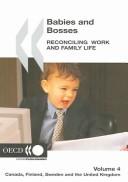
ISBN: 1280356472 9786610356478 9264009299 9264009280 Year: 2005 Publisher: Paris : OECD,
Abstract | Keywords | Export | Availability | Bookmark
 Loading...
Loading...Choose an application
- Reference Manager
- EndNote
- RefWorks (Direct export to RefWorks)
This book considers how a wide range of policies, including tax/benefit policies, childcare policy, and employment and workplace practices help determine parental labour market outcomes and may impinge on family formation and ultimately the current and future labour supply. It covers Canada (in particular the province of Québec), Finland, Sweden and the United Kingdom and also includes some options for policy reform towards a better reconciliation of work and family commitments in the four countries in question. Other Babies and Bosses volumes cover Australia, Denmark and the Netherlands, which was published in 2002; Austria, Ireland and Japan, which was published in 2003; and New Zealand, Portugal and Switzerland; which was released in 2004. An overview issue that will include key indicators on family-friendly policies in all OECD countries will be released later in 2005.
Child care -- Government policy -- OECD countries. --- Child care -- OECD countries. --- Child care. --- Family policy -- OECD countries. --- Family policy. --- Parental leave -- Government policy -- OECD countries. --- Work and family -- Government policy -- OECD countries. --- Work and family -- OECD countries. --- Work and family. --- Social Welfare & Social Work --- Social Sciences --- Child & Youth Development --- Child care --- Work and family --- Family policy --- Families --- Families and state --- State and families --- Families and work --- Family and work --- Care of children --- Childcare --- Children --- Government policy --- Care --- Care and hygiene --- Public welfare --- Social security --- Social policy --- Dual-career families --- Work-life balance --- Canada --- Finland --- Sweden --- United Kingdom
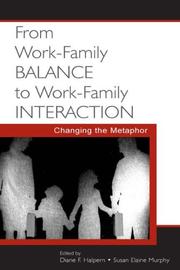
ISBN: 080584886X 0805848878 9786612379031 1135614903 1282379038 1410612090 9781410612090 9781135614904 9781135614850 9781135614898 9780805848861 9780805848878 Year: 2005 Publisher: Mahwah, NJ : Lawrence Erlbaum,
Abstract | Keywords | Export | Availability | Bookmark
 Loading...
Loading...Choose an application
- Reference Manager
- EndNote
- RefWorks (Direct export to RefWorks)
There are many lessons to be learned about work-family interaction. It is clear that some people have learned how to combine work and family in ways that are mutually supporting--at least much of the time--and some employers have created work environments and policies that make positive interdependence of these two spheres more likely to occur. This book discusses measures of work-family, conflict, policies designed to reduce conflict, comparisons with other industrialized nations, and reasons why family-friendly work-policies have not been adopted with enthusiasm. The purpose is to consider a
Dual-career families. --- Career couples --- Couples, Dual-income --- Couples, Two-career --- Dual-career couples --- Dual-career marriage --- Dual-income couples --- Two-career couples --- Two-earner families --- Working couples --- Work and family. --- Family policy. --- Social networks. --- Networking, Social --- Networks, Social --- Social networking --- Social support systems --- Support systems, Social --- Interpersonal relations --- Cliques (Sociology) --- Microblogs --- Families --- Work and family --- Families and state --- State and families --- Public welfare --- Social security --- Social policy --- Families and work --- Family and work --- Dual-career families --- Work-life balance --- Government policy --- Family policy --- Social networks --- Travail et famille --- Politique familiale --- Familles à double carrière --- Réseaux sociaux
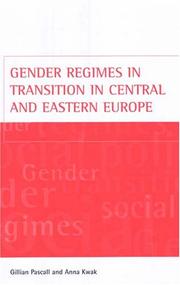
ISBN: 1281159646 9786611159641 184742144X 1861346255 9781847421449 9781861346254 Year: 2005 Publisher: Bristol The Policy Press
Abstract | Keywords | Export | Availability | Bookmark
 Loading...
Loading...Choose an application
- Reference Manager
- EndNote
- RefWorks (Direct export to RefWorks)
This book uses recent debates on welfare regimes and gender to illuminate the changing gender regimes in countries of Central and Eastern Europe. It has particular significance as countries in the region make the transition from communism into a European Union with issues of women's employment and gender equality at the heart of its social policy.
Family policy --- Sex role --- Social change --- Europe, Eastern --- Europe, Central --- Social conditions --- Families --- Families and state --- State and families --- Public welfare --- Social security --- Social policy --- Change, Social --- Cultural change --- Cultural transformation --- Societal change --- Socio-cultural change --- Social history --- Social evolution --- Gender role --- Sex (Psychology) --- Sex differences (Psychology) --- Social role --- Gender expression --- Sexism --- Government policy --- Gender roles --- Gendered role --- Gendered roles --- Role, Gender --- Role, Gendered --- Role, Sex --- Roles, Gender --- Roles, Gendered --- Roles, Sex --- Sex roles --- Political philosophy. Social philosophy --- Sociology of the developing countries --- Sociology of the family. Sociology of sexuality --- Sociology of work --- Sociology of social care --- Sociology of social welfare --- Political transition --- Equal opportunities --- Family --- Labour --- Care --- Book --- Communism --- Poland --- Eastern and Central Europe --- Europe --- Mothers --- Rôle selon le sexe --- Changement social --- Mères --- Conditions sociales --- Social conditions.
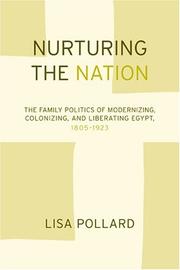
ISBN: 0520230235 1282762982 1597347795 9786612762987 0520937538 9780520937536 9781597347792 0520240227 9780520240223 0520240235 9780520240230 Year: 2005 Publisher: Berkeley, Calif. University of California Press
Abstract | Keywords | Export | Availability | Bookmark
 Loading...
Loading...Choose an application
- Reference Manager
- EndNote
- RefWorks (Direct export to RefWorks)
Focusing on gender and the family, this erudite and innovative history reconsiders the origins of Egyptian nationalism and the revolution of 1919 by linking social changes in class and household structure to the politics of engagement with British colonial rule. Lisa Pollard deftly argues that the Egyptian state's modernizing projects in the nineteenth century reinforced ideals of monogamy and bourgeois domesticity among Egypt's elite classes and connected those ideals with political and economic success. At the same time, the British used domestic and personal practices such as polygamy, the harem, and the veiling of women to claim that the ruling classes had become corrupt and therefore to legitimize an open-ended tenure for themselves in Egypt. To rid themselves of British rule, bourgeois Egyptian nationalists constructed a familial-political culture that trained new generations of nationalists and used them to demonstrate to the British that it was time for the occupation to end. That culture was put to use in the 1919 Egyptian revolution, in which the reformed, bourgeois family was exhibited as the standard for "modern" Egypt.
Family policy --- Families --- Families and state --- State and families --- Public welfare --- Social security --- Social policy --- Family --- Family life --- Family relationships --- Family structure --- Relationships, Family --- Structure, Family --- Social institutions --- Birth order --- Domestic relations --- Home --- Households --- Kinship --- Marriage --- Matriarchy --- Parenthood --- Patriarchy --- History. --- Government policy --- Social aspects --- Social conditions --- Egypt --- Égypte --- Ägypten --- Egitto --- Egipet --- Egiptos --- Miṣr --- Southern Region (United Arab Republic) --- Egyptian Region (United Arab Republic) --- Iqlīm al-Janūbī (United Arab Republic) --- Egyptian Territory (United Arab Republic) --- Egipat --- Arab Republic of Egypt --- A.R.E. --- ARE (Arab Republic of Egypt) --- Jumhūrīyat Miṣr al-ʻArabīyah --- Mitsrayim --- Egipt --- Ijiptʻŭ --- Misri --- Ancient Egypt --- Gouvernement royal égyptien --- جمهورية مصر العربية --- مِصر --- مَصر --- Maṣr --- Khēmi --- エジプト --- Ejiputo --- Egypti --- Egypten --- מצרים --- United Arab Republic --- History --- Cross-cultural studies --- History of Africa --- anno 1800-1899 --- anno 1900-1909 --- anno 1910-1919 --- anno 1920-1929 --- Family & relationships --- Families. --- Family policy. --- Family. --- Alternative family. --- Reference. --- General --- 1800-1999. --- Egypt. --- 1919 egyptian revolution. --- 19th century. --- bourgeois family. --- british colonial rule. --- class changes. --- colonialism. --- cultural perspective. --- domesticity. --- economic growth. --- egypt. --- egyptian nationalism. --- elite classes. --- familial political culture. --- family politics. --- family structure. --- gender norms. --- gender roles. --- historians. --- household structure. --- modern egypt. --- modernization. --- monogamy. --- political success. --- polygamy. --- postcolonialism. --- ruling classes. --- social changes. --- social history. --- social standards.
| Listing 1 - 7 of 7 |
Sort by
|

 Search
Search Feedback
Feedback About UniCat
About UniCat  Help
Help News
News